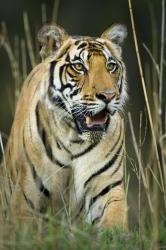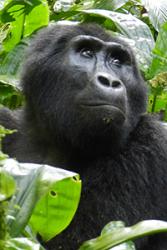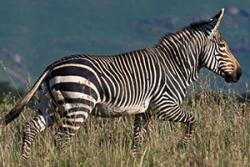Conservation scientists call for global strategy to halt threatened animal extinctions
Media Release from Oregon State University
 Male Bengal Tiger (Panthera tigris tigris) walking through long grass. Kanha National Park, Madhya Pradesh, India.: Image credit Nick garbutt via Oregon State University.Aiming to stop the looming extinction of large wild-animal species across the globe, a group of international conservation scientists has issued a call for actions to halt further declines.
Male Bengal Tiger (Panthera tigris tigris) walking through long grass. Kanha National Park, Madhya Pradesh, India.: Image credit Nick garbutt via Oregon State University.Aiming to stop the looming extinction of large wild-animal species across the globe, a group of international conservation scientists has issued a call for actions to halt further declines.
In today’s edition of the journal , 43 wildlife experts from six continents note that an extinction crisis is unfolding for large mammals, from those that are poorly known, such as the scimitar-horned oryx, to more familiar species such as gorillas and rhinoceroses.
They have issued a 13-point declaration that calls for acknowledgement of threats, a halt to harmful practices, a global commitment to conservation and recognition of a moral obligation to protect the planet’s large animals, or megafauna.
“The more I look at the trends facing the world’s largest terrestrial mammals, the more concerned I am we could lose these animals just as science is discovering how important they are to ecosystems and to the services they provide to people,” said William Ripple, distinguished professor of ecology in the College of Forestry at Oregon State University and lead author. “It’s time to really think about conserving them because declines in their numbers and habitats are happening quickly.”
Ripple has studied the ecological effects of predators such as cougar and wolves in North America, and collaborated with other wildlife experts to analyze global trends facing large carnivores — wolves, lions, tigers and bears — as well as large herbivores, including elephants, rhinos, zebras and tapirs.
“Most mammalian megafauna face dramatic range contractions and population declines,” the authors wrote. “In fact, 59 percent of the world’s largest carnivores and 60 percent of the world’s largest herbivores are classified as threatened with extinction on the International Union for the Conservation of Nature Red List. This situation is particularly dire in sub-Saharan Africa and Southeast Asia, home to the greatest diversity of extant megafauna.”
Among the most serious threats to endangered animals, they wrote, are the expansion of livestock and crop operations, illegal hunting, deforestation and human population growth.
“Human communities stand to lose key elements of their natural heritage if megafauna species are allowed to go extinct,” said co-author Peter Lindsey of Panthera, a nonprofit organization dedicated to conserving wild cat species.
“In addition, the disappearance of such species could significantly undermine the future potential for communities to benefit from tourism. In areas where people live with these species, there is a need for mechanisms to promote coexistence. We need to minimize the negative impacts on local communities that stem from human-wildlife conflict or risk to human life.”
The scientists call for action on two fronts: expanded interventions at scales that are relevant to animals’ habitat needs, and large-scale policy shifts to alter the ways in which people interact with large animals.
The authors emphasized that some conservation initiatives have had success.
 The threatened Eastern gorilla, (Gorilla gorilla). : Photo by Peter Stoel via Oregon State University.Matt Hayward, a co-author from �鶹�� in Wales, U.K. has experienced this success first hand. “The elephants in the Addo region of South Africa were hunted almost to extinction. When Addo Elephant National Park was created in 1931 only 11 elephant remained. Through intensive protection, and more recently the introduction of new genes, this population of megaherbivores has increased to over 600 individuals. A similar scenario has played out with European bison in Białowieźa, Poland. We need to learn from these success stories and apply the lessons more broadly.”
The threatened Eastern gorilla, (Gorilla gorilla). : Photo by Peter Stoel via Oregon State University.Matt Hayward, a co-author from �鶹�� in Wales, U.K. has experienced this success first hand. “The elephants in the Addo region of South Africa were hunted almost to extinction. When Addo Elephant National Park was created in 1931 only 11 elephant remained. Through intensive protection, and more recently the introduction of new genes, this population of megaherbivores has increased to over 600 individuals. A similar scenario has played out with European bison in Białowieźa, Poland. We need to learn from these success stories and apply the lessons more broadly.”
However, they added, the resources for effective implementation of conservation strategies are seldom available in regions with the greatest needs. “Therefore,” they wrote, “the onus is on developed countries, which have long ago lost most of their megafauna,” to conserve their own species and to support initiatives in other regions.
The article is published in six languages in addition to English: Spanish, French, Chinese, Malay, Portuguese and Thai. “The translations were provided by some of the co-authors,” said Ripple.
“We must not go quietly into this impoverished future,” the authors wrote. “Rather, we believe it is our collective responsibility, as scientists who study megafauna, to act to prevent their decline. We therefore present a call to the broader international community to join together in conserving the remaining terrestrial megafauna.”
Among Ripple’s co-authors are Oregon State colleagues Michael Nelson, Robert Beschta and Christopher Wolf, all in the College of Forestry; and Taal Levi in the College of Agricultural Sciences.
 The Mountain zebra (Equus zebra).: Photo by Halska Hrabar via Oregon State University.Some of the other organizations represented among the authors include the International Union for the Conservation of Nature; World Wildlife Fund; the University of Oxford; the Swedish University of Agricultural Sciences; the University of Pretoria and Nelson Mandela University in South Africa; the Chinese Academy of Sciences and Beijing Normal University in China; the University of Sydney and the University of New South Wales in Australia; the Universidad Estadual Paulista in Brazil; the Wildlife Conservation Society in Bangalore, India; and the University of Nottingham Malaysia Campus.
The Mountain zebra (Equus zebra).: Photo by Halska Hrabar via Oregon State University.Some of the other organizations represented among the authors include the International Union for the Conservation of Nature; World Wildlife Fund; the University of Oxford; the Swedish University of Agricultural Sciences; the University of Pretoria and Nelson Mandela University in South Africa; the Chinese Academy of Sciences and Beijing Normal University in China; the University of Sydney and the University of New South Wales in Australia; the Universidad Estadual Paulista in Brazil; the Wildlife Conservation Society in Bangalore, India; and the University of Nottingham Malaysia Campus.
Publication date: 28 July 2016
